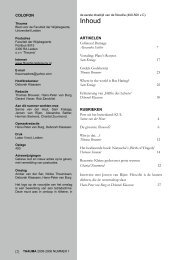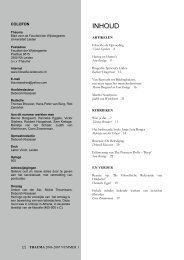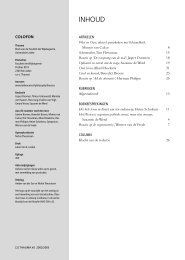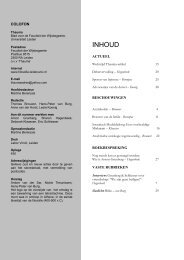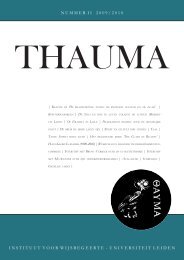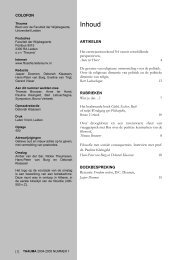You also want an ePaper? Increase the reach of your titles
YUMPU automatically turns print PDFs into web optimized ePapers that Google loves.
Heideggers Welt-analyse / Auke Briek Het beslissende boek<br />
Wittgenstein’s Tractatus Logico-Philosophicus<br />
Göran Sundholm<br />
van de hamer zijn. Het probleem met<br />
deze substantivering is echter, dat de<br />
bruikbaarheid van de hamer afhankelijk is<br />
van de gebruikscontext. Wanneer we een<br />
huis bouwen, dan is een hamer inderdaad<br />
om spijkers in twee stukken hout te slaan.<br />
Wanneer we een houten tafel demonteren<br />
om het afval gemakkelijker te verwerken,<br />
dan blijkt de betekenis van die<br />
hamer in deze gebruikscontext<br />
omgedraaid te zijn. In dat<br />
laatste geval is de hamer<br />
namelijk om spijkers<br />
uit twee stukken<br />
hout te trekken. Dit<br />
eenvoudige voorbeeld<br />
laat zien dat de<br />
bruikbaarheid van een<br />
gebruiksvoorwerp niet<br />
iets van dit voorwerp<br />
zelf is, maar van de<br />
context waarin het<br />
gebruikt wordt. Het laat<br />
zien dat de wijze waarop de<br />
hamer aanwezig is (de zijnswijze<br />
van de hamer) niet begrepen kan worden<br />
in termen van substantie en accident. 9<br />
In plaats daarvan is de hamer aanwezig<br />
vanuit de gebruikscontext en bepalend<br />
voor deze context is het geheel van<br />
gebruiksmogelijkheden dat zich daarin<br />
ontvouwt. Heideggers analyse van de<br />
zijnswijze van gebruiksvoorwerpen in<br />
termen van betekenisgehelen blijkt dus lang<br />
zo gek nog niet.<br />
Das Dasein<br />
ist seine<br />
Erschlossenheit<br />
noten:<br />
1 M. Heidegger (1993), Sein und Zeit, Max Niemeyer Verlag,<br />
Tübingen, p. 1, 5.<br />
2 ibid., p. 107.<br />
3 A. Verbrugge (2001), De verwaarlozing van het zijnde:<br />
een ethologisch kritiek van Heideggers Sein und Zeit, SUN,<br />
Nijmegen, p. 29, 33-37.<br />
4 M. Heidegger, op.cit., p. 53.<br />
5 ibid., p. 62.<br />
6 ibid., p. 133.<br />
7 ibid., p. 69.<br />
8 ibid., p. 83-87.<br />
9 H. Dreyfus (1991), Being-in-the-world: a<br />
commentary on Heidegger’s Being and time,<br />
MIT press, New Baskerville, p.<br />
The teacher’s strike in Sweden, in the<br />
spring of 1971 - a true paradise for an<br />
academically inclined youngling. Six weeks<br />
of unadulterated freedom to read what one<br />
wanted, without straightjackets imposed<br />
either by the teachers or the examination<br />
schedules at the Gymnasium Beta, where I<br />
was then a pupil. The public library in my<br />
home city of Linköping was exceptionally<br />
good. It was one of four “Diocesan and<br />
Provincial” Libraries in Sweden. While<br />
not academic university libraries, these<br />
libraries still had scholarly and<br />
scientific pretensions, and, as<br />
we shall see, not without some<br />
justification.<br />
On a memorable day in March,<br />
as was my wont, I spent long<br />
hours in the library, reading<br />
whatever took my fancy; on a return<br />
trolley there was a row of books, bound<br />
in identical green, supposedly greaserepellent<br />
bindings, with titles in gold on the<br />
spines. I wished to pick up a volume <strong>–</strong> Rolig<br />
Astronomi (“Astronomy made fun”, on<br />
how to build one’s own reflection telescope)<br />
<strong>–</strong> when my hand shot miss and instead I<br />
picked up the book next to it, which proved<br />
to be the Swedish translation by Anders<br />
Wedberg of Wittgenstein’s Tractatus. I had<br />
had no previous exposure to philosophy,<br />
which was taught only in the final year<br />
of the Gymnasium. Nevertheless, its first<br />
strange sentence appealed to me: “Världen<br />
är allt som är fallet”. I borrowed the book,<br />
and the rest is history.<br />
Apart from this Swedish translation,<br />
the library also possessed the Pears-<br />
McGuinness parallel German-English<br />
edition from 1971, as well as commentaries<br />
in English by Erik Stenius and David<br />
Favrholdt. There were also books by<br />
Wittgenstein’s successor in Cambridge,<br />
the Finnish-Swedish philosopher Georg-<br />
Henrik von Wright, on Logical Empiricism<br />
and on Logic, Philosophy, and Language,<br />
that were written in a remarkably elegant<br />
Swedish. (The prose of the Swedish<br />
speaking minority in Finland is often of an<br />
outstanding quality.) I quickly worked my<br />
way through these works and moved on to<br />
logic. Regarding this subject I discovered<br />
that both Quine’s Methods of Logic and<br />
Mathematical Logic were to be found in<br />
the collection. Also Elliot Mendelson’s<br />
more advanced Introduction to<br />
Mathematical Logic could be found<br />
on the shelves for mathematics.<br />
When I left the gymnasium in 1972,<br />
in order to study Mathematics and<br />
Theoretical Philosophy at Lund, I<br />
had mastered these books and several<br />
others that I had bought; e.g. Tarski’s<br />
Logic, Semantics, and Metamathematics,<br />
and Carnap’s Logical Syntax of Language.<br />
Clearly I had found my proper field of study.<br />
Since then I have reread the Tractatus at<br />
least once a year, and I have often taught it.<br />
It remains the finest exposition of realism<br />
in logic, a realism, however, that I do not<br />
share. But, as Wittgenstein observed,<br />
apropos of Frege’s habit of attacking<br />
idealism where it was at its weakest, it is<br />
much better to attack it where it is at its<br />
strongest. In general, one’s own philosophy<br />
will only benefit from choosing worthy<br />
opponents. Thus, perhaps paradoxically,<br />
the arch-realists Bolzano, Frege, and the<br />
Wittgenstein of the Tractatus, are prime<br />
sources of inspiration, to which I return<br />
again and again, in order to feed my antirealism.<br />
And thus, still after forty years, the<br />
Tractatus remains my decisive book.



